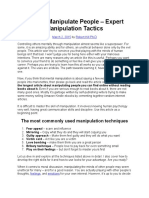Dark Psychology
Dark Psychology
Uploaded by
lithgowlisbethCopyright:
Available Formats
Dark Psychology
Dark Psychology
Uploaded by
lithgowlisbethOriginal Title
Copyright
Available Formats
Share this document
Did you find this document useful?
Is this content inappropriate?
Copyright:
Available Formats
Dark Psychology
Dark Psychology
Uploaded by
lithgowlisbethCopyright:
Available Formats
Dark psychology & Manipulation
Dark psychology refers to the study and application
of psychological knowledge, techniques, and
strategies that are used to manipulate, exploit, and
control individuals without their awareness or
consent. It involves understanding how to influence
and deceive others in ways that can be harmful or
detrimental to their well-being. The term "dark"
implies that these practices often involve unethical,
malicious, or harmful intentions, and they can be
used to gain power, control, or advantage over
others.
Manipulation is the act of influencing or controlling
someone's thoughts, emotions, or behaviors in a way
that serves the manipulator's interests or objectives.
It involves using tactics, strategies, or deceptive
methods to guide or coerce others into specific
actions or beliefs. Manipulation can be subtle or
overt and may exploit the vulnerabilities or weaknesses of the targeted individual to achieve the
manipulator's goals. It can occur in various contexts, such as personal relationships, social
interactions, politics, and marketing.
It is crucial to recognize that while psychology can be used for positive and constructive
purposes, "dark psychology" and manipulation are associated with harmful and unethical
practices. It's essential to promote ethical behavior, respect for others' autonomy, and responsible
use of psychological knowledge to ensure the well-being and safety of individuals in any
context.
Identifying victims of abuse through dark psychology can be challenging because manipulators
often employ subtle tactics that make it difficult for victims to recognize the abuse. However,
certain signs and behaviors may indicate that someone is being manipulated or abused using dark
psychology techniques. This techniques could be from victims who may show signs of being
abused:
Individuals in Close Relationships: Victims can be spouses, partners, family members,
close friends, or colleagues who are emotionally connected to the manipulator.
Vulnerable Individuals: Those who are experiencing emotional or psychological
vulnerabilities, such as low self-esteem, past trauma, or anxiety, may be more susceptible
to manipulation.
Isolated Individuals: People who are socially isolated and lack a strong support network
may be more at risk of falling prey to manipulators.
Mary Lisbeth Lithgow A00148946
Dependent Individuals: Individuals who are financially or emotionally dependent on the
manipulator may be more likely to endure the abuse.
Naive or Trusting Individuals: People who are excessively trusting, optimistic, or have
a difficulty recognizing deception might be easier targets.
Individuals Seeking Approval or Validation: Those who seek validation or approval
from others may be vulnerable to manipulators who exploit this need.
People Experiencing Transition or Crisis: Individuals going through significant life
changes, such as job loss, divorce, or grief, may be more susceptible to manipulation.
Individuals with High Empathy: People who are highly empathetic and compassionate
may be more willing to overlook red flags or dismiss manipulative behavior.
Seniors and Elderly: Older individuals may be targeted due to potential cognitive
decline or a desire for companionship.
It's crucial to remember that anyone can
be a victim of manipulation, and these
indicators are not definitive proof of
abuse. People may also hide signs of
abuse, making it even harder to detect. If
you suspect someone may be a victim of
abuse or manipulation, it's important to
approach the situation with sensitivity and
care. Encouraging open communication,
providing support, and offering resources for professional help can be essential in helping
potential victims regain their agency and well-being. If you believe someone is in immediate
danger, contacting relevant authorities may be necessary to ensure their safety
Manipulators use a variety of techniques to exploit and control their victims. These techniques
are often subtle and can be challenging to recognize, making it crucial to be aware of potential
manipulation tactics. Here are some common techniques that manipulators may employ:
Gaslighting: Manipulators use gaslighting to make their victims doubt their perceptions,
memories, and sanity. They may deny previous conversations or events, leading the
victim to question their own reality.
Love Bombing: In the initial stages of a relationship, manipulators may "love bomb"
their victims with excessive praise, attention, and affection to create a strong emotional
bond and dependency.
Guilt-Tripping: Manipulators use guilt to make their victims feel responsible for their
emotions or actions, leading them to comply with the manipulator's demands.
Isolation: Manipulators may try to isolate their victims from friends and family to
weaken their support network and increase dependency on the manipulator.
Mary Lisbeth Lithgow A00148946
Projection: Manipulators may project their negative traits or behaviors onto their
victims, making the victim feel at fault for the manipulator's actions.
Selective Amnesia: Manipulators conveniently "forget" promises or commitments they
made, causing their victims to doubt their own recollections.
Negative Reinforcement: Manipulators may use negative consequences, such as
withdrawal of affection or silent treatment, to control their victims' behaviors.
Emotional Blackmail: Manipulators use emotional blackmail to manipulate their victims
into doing something they don't want to do by using threats or emotional pressure.
The "Pity Play": Manipulators may play the victim themselves, garnering sympathy
from others to deflect attention from their harmful actions.
Seduction: Manipulators may use charm, flattery, or seduction to lower their victims'
defenses and gain trust.
Divide and Conquer: Manipulators may pit individuals or groups against each other to
weaken resistance and maintain control.
Denial and Minimization: Manipulators often deny their harmful actions or minimize
their impact on the victim to avoid accountability.
It's important to remember that these techniques can be used in various combinations and can
differ based on the individual manipulator's tactics. If you suspect that someone is using
manipulative techniques, it's crucial to encourage open communication, trust your instincts, seek
support from friends or family, and consider seeking help from a professional therapist or
counselor.
Mary Lisbeth Lithgow A00148946
You might also like
- How To Easily Sleep With Any Woman You Want (Franco Seduction) (Z-Library)Document81 pagesHow To Easily Sleep With Any Woman You Want (Franco Seduction) (Z-Library)Itz ZohaibNo ratings yet
- Becoming A Femme FataleDocument18 pagesBecoming A Femme FataleHilary A. TOLEDANONo ratings yet
- 30 Manipulation TechniquesDocument64 pages30 Manipulation Techniquesmrvrushabh007100% (1)
- HereDocument3 pagesHeresakshi more0% (1)
- The Secrets of Sex Magick-Seduction Manual - ArticleDocument17 pagesThe Secrets of Sex Magick-Seduction Manual - Articlewobblegobble88% (24)
- The Art of Seduction Book SummaryDocument2 pagesThe Art of Seduction Book SummarydhakaeurekaNo ratings yet
- Mindfucking PDFDocument93 pagesMindfucking PDFfgfgjlfnglkNo ratings yet
- Seduction Warfare Author No Bullsht Seduction (NBS)Document12 pagesSeduction Warfare Author No Bullsht Seduction (NBS)Silly BearNo ratings yet
- Dark PsychologyDocument9 pagesDark PsychologyRovin RamphalNo ratings yet
- How To Manipulate People - Expert Manipulation Tactics: The Most Commonly Used Manipulation TechniquesDocument9 pagesHow To Manipulate People - Expert Manipulation Tactics: The Most Commonly Used Manipulation TechniquesRichard BakerNo ratings yet
- Mind ControlDocument5 pagesMind ControlSunčica Nisam100% (2)
- Dark Psychology - Mind Control and Manipulation SecretsDocument49 pagesDark Psychology - Mind Control and Manipulation SecretsmrererNo ratings yet
- 12 Must Read Manipulation Books ListDocument1 page12 Must Read Manipulation Books ListveqmahwxqzzimuqymoNo ratings yet
- How To Manipulate WomenDocument7 pagesHow To Manipulate WomenssxdzpelonaNo ratings yet
- How To Get What You Want Every TimeDocument1 pageHow To Get What You Want Every Timelaureen.guillaumepNo ratings yet
- Mastering The Art of Seducing WomanDocument1 pageMastering The Art of Seducing WomanKrishna JashaNo ratings yet
- Sex Transmutation by George HuttonDocument124 pagesSex Transmutation by George HuttontempullyboneNo ratings yet
- The Art 300 Second SeductionDocument2 pagesThe Art 300 Second SeductionRobert Rael100% (1)
- Deep Web ManipulationDocument49 pagesDeep Web Manipulationblackdevil127.0.0.1100% (1)
- Path of The Fool Michael TsarionDocument317 pagesPath of The Fool Michael Tsariontrung voNo ratings yet
- Kashaf 20Document3 pagesKashaf 20sohaNo ratings yet
- OceanofPDF - Com Dark Psychology Secrets - Rachel JacksonDocument149 pagesOceanofPDF - Com Dark Psychology Secrets - Rachel JacksonDorka TakácsNo ratings yet
- Dark Psychology 202 - The Advance Secrets of Psychological - Pace, Michael - 2017 - Make Profits Easy LLC - Anna's ArchiveDocument164 pagesDark Psychology 202 - The Advance Secrets of Psychological - Pace, Michael - 2017 - Make Profits Easy LLC - Anna's Archivexasixa4647No ratings yet
- Cryokinesis - Is It Possible To Learn This Power and Manipulate Ice?Document19 pagesCryokinesis - Is It Possible To Learn This Power and Manipulate Ice?Amir Hossein RamezaniNo ratings yet
- War Room LettersDocument21 pagesWar Room LettersSaad KhanNo ratings yet
- 169 215 2 PBDocument67 pages169 215 2 PBvineethNo ratings yet
- Discovering Dark Psychology: Mind Manipulation Trilogy: Exploring the Mysteries and Enigmas of Dark Psychology, #3From EverandDiscovering Dark Psychology: Mind Manipulation Trilogy: Exploring the Mysteries and Enigmas of Dark Psychology, #3No ratings yet
- The Art of ManipulationDocument64 pagesThe Art of Manipulationmarketing.swplNo ratings yet
- Toxicophis PugnaxDocument15 pagesToxicophis PugnaxMuhammad Ata Ul MustafaNo ratings yet
- Dialog With A Master TreeDocument4 pagesDialog With A Master TreeAngelica McdowellNo ratings yet
- ONAMIII Black CompressedDocument42 pagesONAMIII Black CompressedJuju Ơi100% (1)
- Seduction 101Document4 pagesSeduction 101mudabber.musawerNo ratings yet
- 10 @free - Courses - Mega - Drive - LinkDocument12 pages10 @free - Courses - Mega - Drive - Linkaarushmishra130No ratings yet
- Mind Control & Hypnosis Psychic SeductionDocument41 pagesMind Control & Hypnosis Psychic SeductionOmar Kamal Lodhi75% (4)
- Hypnosis - Seduction Manual - The Secrets of Sex MagickDocument17 pagesHypnosis - Seduction Manual - The Secrets of Sex MagickAnonymous QPE0Vp4mL88% (8)
- Eye Contact Basics: Signals Women Are GivingDocument6 pagesEye Contact Basics: Signals Women Are Givingzexmaster2No ratings yet
- Taslak How To Manipulate PeopleDocument17 pagesTaslak How To Manipulate PeopleGulare MemisovaNo ratings yet
- Why Women Will Never Be SafeDocument67 pagesWhy Women Will Never Be Safemmnm nnmnNo ratings yet
- Gad 2.02Document67 pagesGad 2.02Edem Wordi100% (1)
- Dark Psychology & Manipulation - Are You Unknowingly Using Them - Dr. Jason JonesDocument1 pageDark Psychology & Manipulation - Are You Unknowingly Using Them - Dr. Jason Jonesrony chidiacNo ratings yet
- An Essay On Sex MagickDocument7 pagesAn Essay On Sex MagicknawazNo ratings yet
- DocumentDocument5 pagesDocumentSaeba SultanaNo ratings yet
- GeminiDocument2 pagesGeminiMaria Moise100% (1)
- Introduction To NeuromarketingDocument34 pagesIntroduction To Neuromarketingmary mary100% (1)
- Manipulation TechniqueDocument91 pagesManipulation TechniqueSARANG KAMDINo ratings yet
- Manifestation AlchemyDocument29 pagesManifestation AlchemyastroarivNo ratings yet
- The Art of StalkingDocument6 pagesThe Art of Stalkingkevinfunk2003No ratings yet
- The Art of CharmDocument1 pageThe Art of CharmSodfa EttafakshiNo ratings yet
- 70 Manipulation Techniques & 350 TipsDocument29 pages70 Manipulation Techniques & 350 Tipssatapathyrinku378No ratings yet
- Hypnotizing Someone With Hypnotic Power Words andDocument12 pagesHypnotizing Someone With Hypnotic Power Words andGabriel Rodriguez100% (1)
- VisualizationDocument3 pagesVisualizationDHARMESH H H UMRETIYANo ratings yet
- The Mechanism of MagicDocument8 pagesThe Mechanism of MagicarpitaNo ratings yet
- 18 Paradigm Frob To Manipulate Your DestinyDocument102 pages18 Paradigm Frob To Manipulate Your Destinyketkiitraj3025No ratings yet
- (Ebook - NLP) Kaiden Fox - The Science of SeductionDocument15 pages(Ebook - NLP) Kaiden Fox - The Science of Seductiondiegoribeiroabc100% (1)





















































